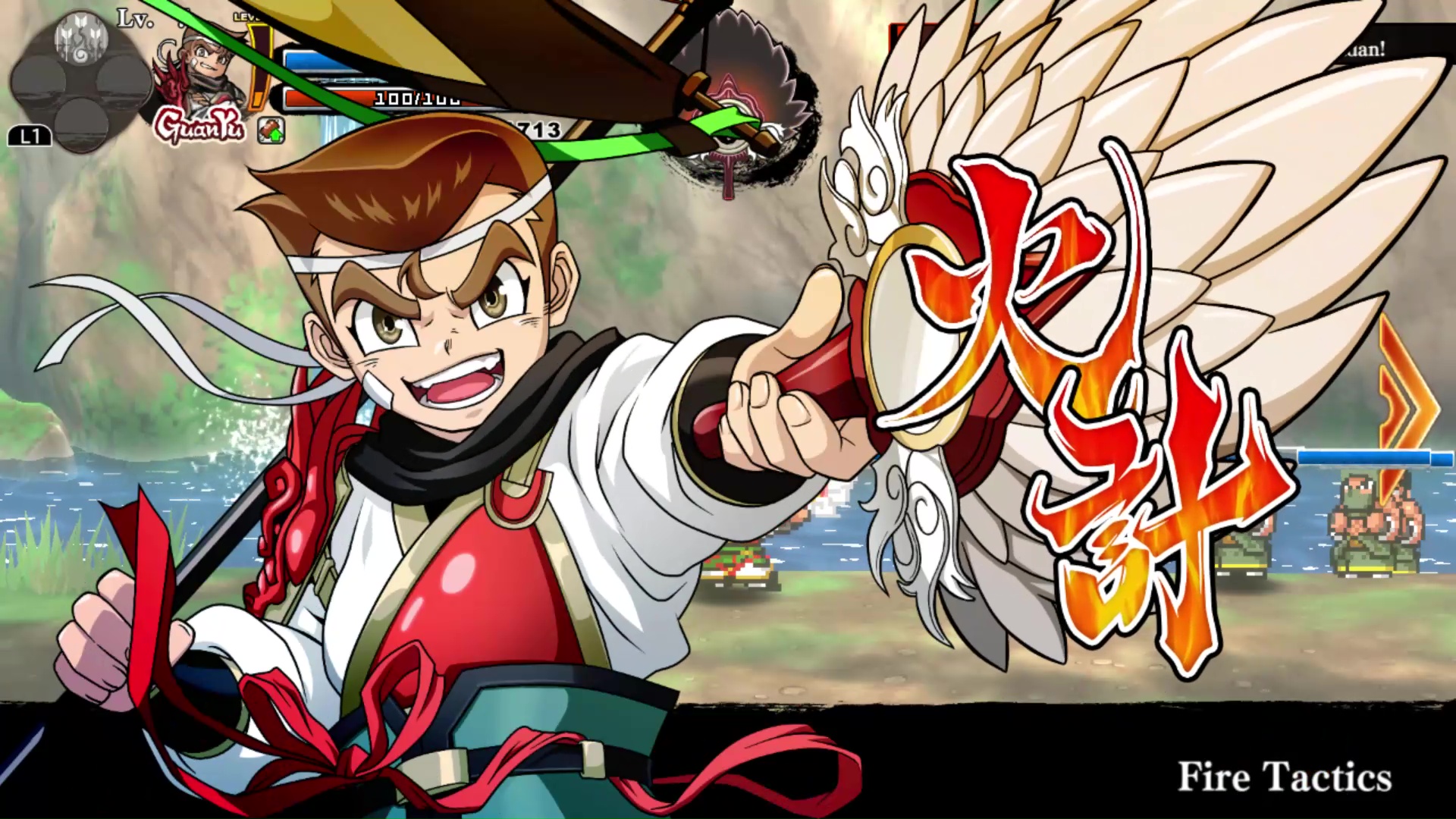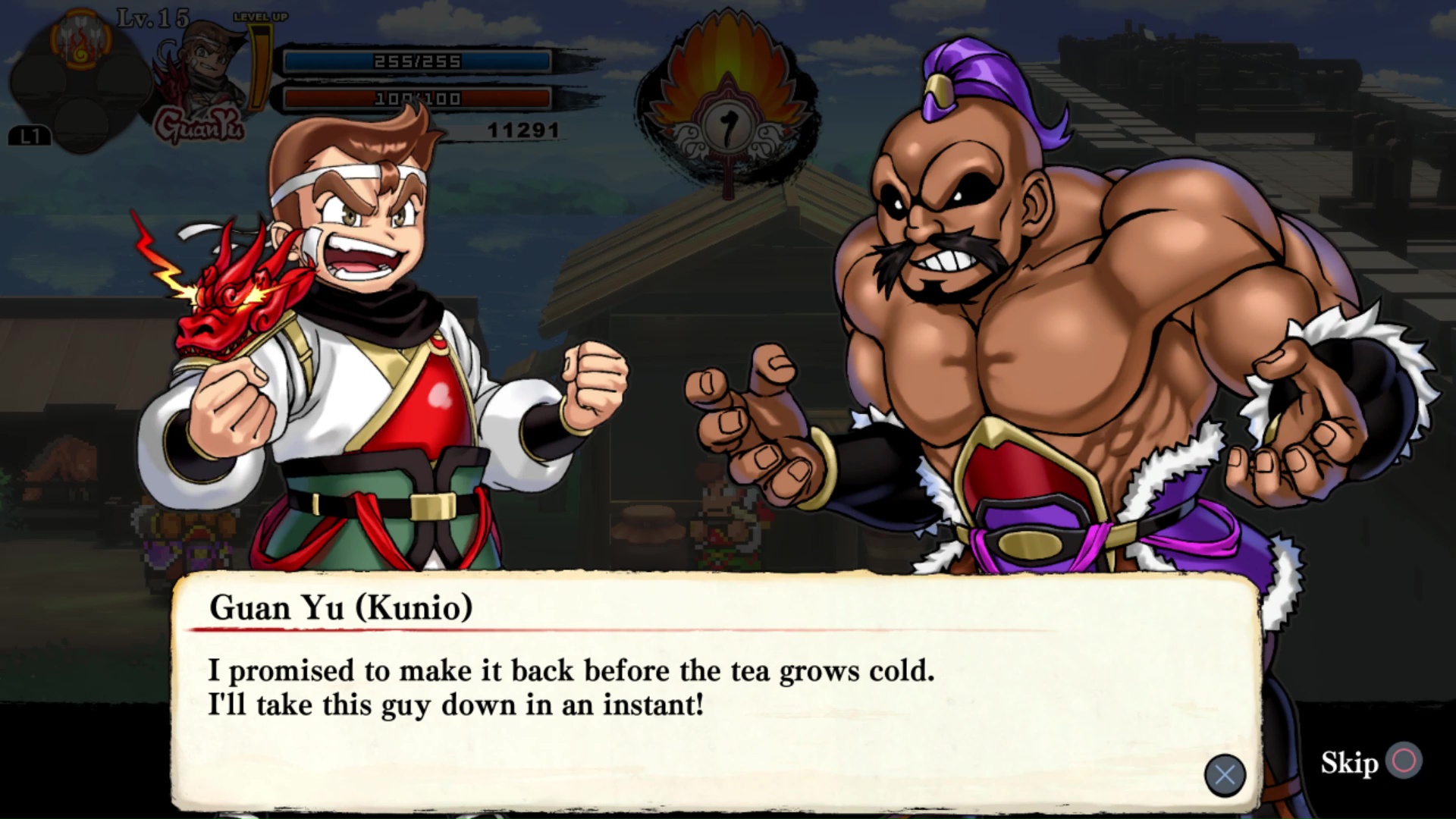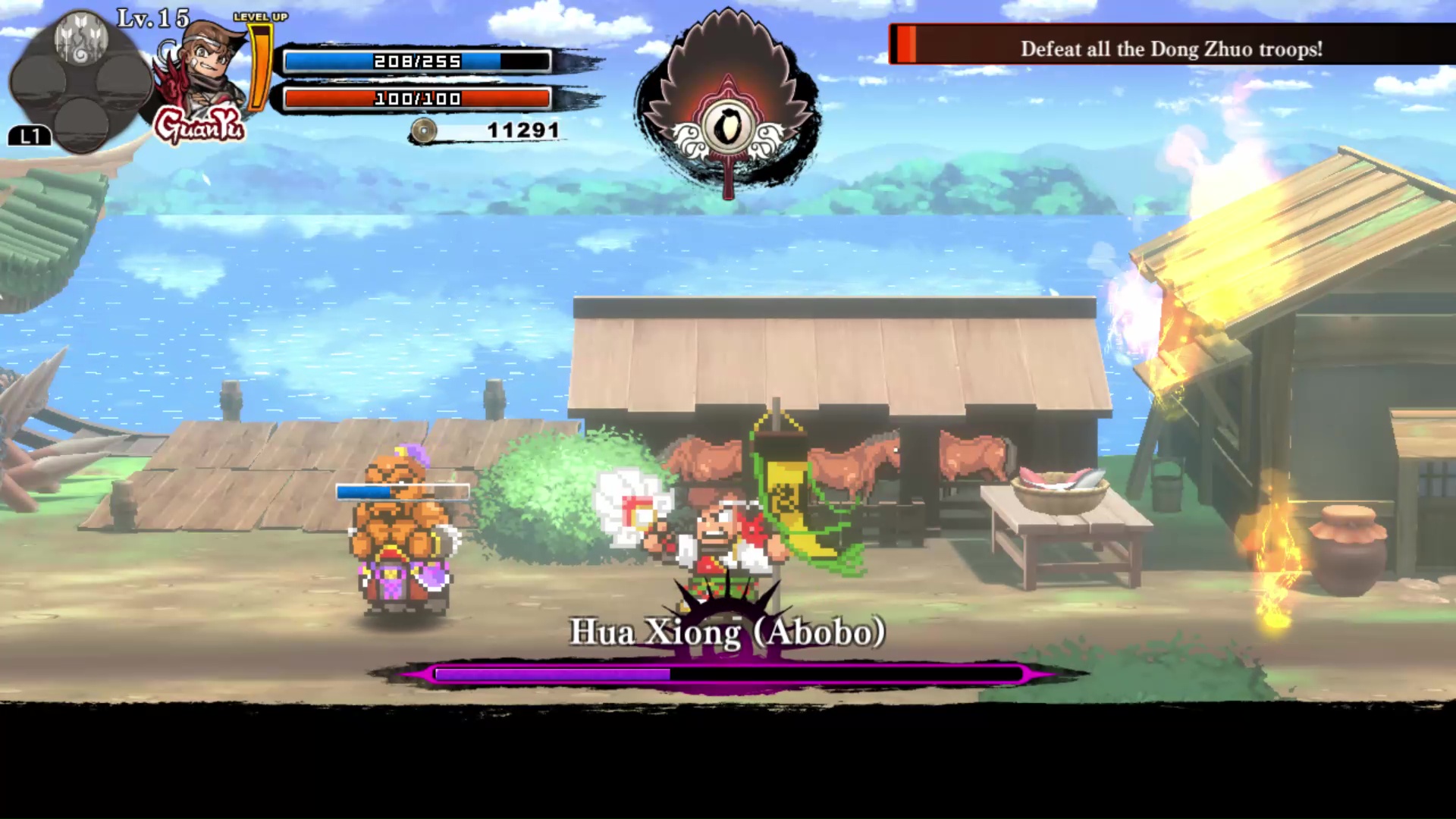I don’t how you’d react to River City Saga: Three Kingdoms if you weren’t a massive River City Ransom mark as a kid. Three Kingdoms essentially is River City Ransom. Both games are free-roaming beat-’em-ups with simple graphics and goofy humor, but in Saga, you’re rampaging across 8-bit, 3rd-century China instead of an urban setting.
It’s also janky as hell, and in 2022, that feels like a choice someone had to make. My nostalgia goggles are working overtime here, so I’m still prepared to recommend River City Saga (RCS). Still, I can see why someone without a long-time, unquestioning affection for the series might not want to bother.
River City Saga: Three Kingdoms Review — Different Streets, Same Fight
The first problem I encountered was the Steam version refusing to recognize my wired Xbox controller. Instead of being able to plug in an Xbox pad and get to work, I had to browbeat RCS into playing nicely with a DualShock 4. I haven’t had problems like this with a Steam game in years.
I might’ve tried playing with the keyboard instead, but that was a non-starter. By default, you use WASD to move, with K/I/L as attack buttons. It’s like using an old emulator to play some forgotten SNES beat-’em-up. While you can freely remap the key bindings, RCS also doesn’t say what its default keys are. I spent my first minute with the game trying to figure out which button started the game, and neither Enter nor the space bar worked.
After that initial, bizarre roadblock, I found RCS comfortably familiar. It’s set up as an entry in the long-running Kunio-kun franchise, which is best represented outside of Japan by River City Ransom and, more recently, River City Girls. Instead of the more vaguely Japanese urban environment typically associated with these games, RCS retells Romance of the Three Kingdoms, with all the big-name roles filled by recognizable Kunio-kun characters.
If you’ve played a Dynasty Warriors game or the last Total War, you know how RotTK goes. This is a chaotic, turbulent period in Chinese history, with numerous warlords feuding for power, which has been immortalized in an influential classic Chinese novel.
Kunio himself plays the part of Guan Yu, who allies with Liu Bei (Gouda) and Zhang Fei (Godai) to fight off the Yellow Bandit Rebellion. That draws the three of them into period conflicts as volunteers, mercenaries, captains, and finally, generals.
It’s a weird look overall, like a Saturday morning cartoon adaptation of the Warring States period. This is a version of Three Kingdoms where three guys, one of whom is objectively a moron, routinely beat up entire military battalions, and where Guan Yu invented the dropkick, powerbomb, and elbow drop in 220 AD. The famous horse Red Hare is represented by a motorcycle. It’s all pretty silly, even before you unlock the ability to kick so hard you create a tornado.
If you’ve played River City Ransom, or more likely River City Girls, Saga is a deliberately retro-styled game in the same vein.
There’s an open map of China, where every path through the countryside is primarily bandits by volume. Enemies come at you in packs of half a dozen or more and turn into bouncing coins when you knock them out. You can spend those coins to buy meals, equipment, or skill books that rapidly increase your combat potential.
Much like Ransom or Girls, Saga is arguably its most challenging in the first 10 minutes, before you’ve unlocked any decent moves. Then it just hands you the dropkick, and suddenly, you’re the pro-wrestling champion of ancient China.
The general idea behind RCS is that it’s the Kunio-kun take on the frantic, you-vs-an-army gameplay in Koei Tecmo’s various Warriors games. Once you have any skills at all, Kunio can plow through a handful of enemies at once, and if he’s got backup, a fight can degenerate into a frantic mess of pixels and numbers.
You’re encouraged to mix up your tactics to find the most degenerate nonsense you can to murder an entire crowd before it has the chance to kill you. When a lot of people compete to punch you, somebody‘s gonna’ land one, and it’s your job to cheat as hard as you can to avoid that. That’s the theory, anyway, because RCS has a strange underbaked quality to it, where you can see what it’s going for and even have some fun, but it can be a slog.
Playing on the medium difficulty, Moderate, you easily end up out-leveling any of the threats you run into, assuming you do any fighting you don’t strictly have to. For most of the game, I rarely ran into an enemy that could do more than 1 point of damage per hit, because I was typically well ahead of the game’s intended power curve.
If you hit a difficulty spike, you have a number of useful tools to even the odds until your stats are up to par.
You can heal on the fly with food from your inventory, and you have a variety of Ultimate moves that let you wipe out at least a few enemies in a hurry. There are also a couple of busted skills, like Aura Punch, that “level” the field, and the new Tactics moves, while difficult to recharge and fickle, can wipe out an entire pack of enemies in a single blast.
Once you learn Water Tactics in particular, the game might as well roll the credits. Some bosses won’t readily survive a dose of Water Tactics, and if you play your cards right, you can use it twice in a row.
The power curve in River City games is traditionally a lot sharper than this. It can be fun to hunt down all the bizarre skills and find interesting combinations for them, particularly in the late game when the war heats up and the opposition gets correspondingly fierce. RCS is even fond of pulling out Street Fighter-style ki moves, which isn’t typical for the series.
That does leave the game in a strange position. Enemies can only slow you down by constantly blocking or catching you in multi-part juggle attacks. It’s easy to get caught off-balance and repeatedly pummeled by six or seven opponents at once, where you’re only given brief windows to counterattack before you’re knocked flat again.
They’re rarely inflicting enough damage to matter, so all they can do is drag out every fight to the point of irritation. It’s a systemic issue, and playing on a higher difficulty doesn’t help.
You also run into a few platforming challenges that aren’t quite up to what Saga‘s engine can accomplish. It’s fine when navigating gauntlets of automated traps — Han Dynasty China also had those; read a book — but the toughest thing in River City Saga is arguably navigating a few narrow ledges or moving barges.
The system is just not set up for accurate jumping, which gets annoying when you have to do it for any sustained period. There’s almost no punishment for failure, so you’ll get it eventually, but it’s obnoxious that you have to do it at all.
River City Saga: Three Kingdoms Review — The Bottom Line
Pros
- A pure blast of 8-bit nostalgia.
- Just some silly fun.
- Co-op mode.
- Some varied gameplay changes up the festival of beatdowns.
- Good music.
- It’s trying something weird and new for the series, at least.
Cons
- The Steam version plays poorly with controllers.
- Strange default keybindings.
- Unavoidably repetitive.
- Really coasting on nostalgia.
- Runs out of steam around the end of Chapter 4.
I don’t have it in me to hate River City Saga, because it is a modern River City Ransom with a few coats of paint and a few useful tweaks. It’s a sillier, more colorful version of one of my favorite childhood games.
Despite my complaints, I like a lot about it; it’s got a freeform, dynamic fighting system made to be deliberately broken for chuckles. More importantly, it’s genuinely charming a lot of the time. There’s a feeling to much of it, especially towards the end, like a community theater production of Romance of the Three Kingdoms put on by a troupe of actors trying to make each other laugh.
At the end of the day, though, I have to admit it wore me down. Its platforming doesn’t work; its fighting is repetitive; it has a bizarre power curve; and the further you get into it, the less interesting it is. My affection for River City/Kunio-kun games pulled me through to the end, but there’s a lot about River City Saga that just does not work as well as it should.
[Note: Arc System Works provided the copy of River City Saga: Three Kingdoms used for this review.]












Published: Jul 21, 2022 02:40 am